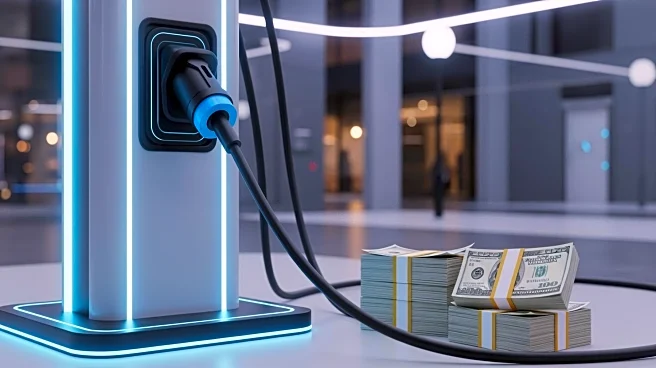What's Happening?
Uber has announced a significant shift in its rideshare offerings by renaming 'Uber Green' to 'Uber Electric,' reflecting the company's commitment to electric vehicle (EV) adoption. This change is part
of Uber's broader strategy to promote zero-emission rides globally. As part of this transition, Uber is offering drivers in select U.S. states a $4,000 grant to purchase new or used electric vehicles. The initiative aims to support drivers in overcoming barriers to EV adoption, especially in light of the expiration of federal grants for used EV purchases. Uber's 'Go Electric' grants are available in California, Colorado, Massachusetts, and New York City, and can be combined with state-specific incentives. Additionally, Uber is offering a 20% discount on EV rides to customers using the promo code GOELECTRIC20.
Why It's Important?
This move by Uber underscores the growing importance of sustainable transportation solutions in the rideshare industry. By incentivizing drivers to switch to electric vehicles, Uber is not only contributing to environmental goals but also potentially reducing operational costs for drivers, given the lower maintenance and fuel costs associated with EVs. The initiative could lead to increased EV adoption among rideshare drivers, improving air quality in urban areas and aligning with broader governmental and societal efforts to combat climate change. For Uber, this transition enhances its brand image as a leader in sustainable mobility and could attract environmentally conscious consumers.
What's Next?
Uber's transition to 'Uber Electric' is expected to influence other rideshare companies to adopt similar sustainable practices. As more drivers switch to electric vehicles, there may be increased demand for charging infrastructure, prompting further investments in EV charging stations by both public and private sectors. Additionally, Uber's initiative could lead to policy discussions around extending or renewing federal incentives for EV purchases, as the company has highlighted the impact of expired grants on driver decisions. The success of Uber's program may also encourage other states to offer additional incentives to promote EV adoption.
Beyond the Headlines
The shift to 'Uber Electric' may have broader implications for the gig economy, as it could set a precedent for other gig-based companies to adopt sustainable practices. This transition also raises questions about the long-term viability of traditional fuel-based vehicles in the rideshare industry, potentially accelerating the shift towards a fully electric fleet. Moreover, the initiative highlights the role of corporate responsibility in addressing environmental challenges, as companies like Uber leverage their influence to drive positive change.










